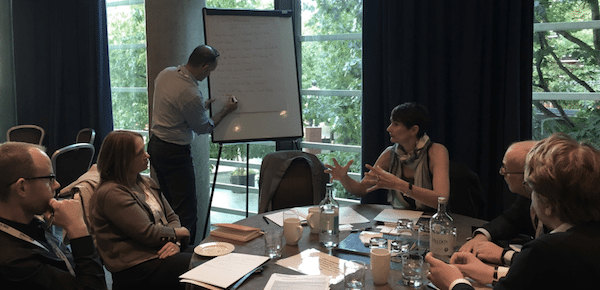
I blogged about the FinTech themes that came out of the Celero conference the other day and forgot to mention that I recently joined a one-day retreat at Payments International in London, as a facilitator. I don’t do such intimate work very often, where I sit with a few people and jaw-jaw, but this was fun. My group were focused upon Distributed Ledger Technology (DLT), otherwise called blockchain. I’ve lost the plot a bit on blockchain these days. A gauge on that score is that I always include DLT and blockchain in my keynotes and someone came up to me yesterday and said:
“I’m so glad that you mentioned blockchain in your speech, as no one talks about it much anymore even though it’s the most important thing ever.”
Yep.
I could write a lot more about that subject, and probably will but, in the meantime, my friends who organised the retreat, as they called it, have written a summary of what transpired. I thought I’d share it …
This past week Claro Partners Co-Founder Aldo de Jong and Sr. Associate Alejandro Ugarte spoke and attended the Payments International Conference in London to exchange ideas with industry experts and dig deep into the payments value chain. As part of the conference, Claro helped to organise a one day retreat on the “Future of FinTech” where we brought together industry thought leaders such as Chris Skinner – Host of FinTech insider, Louise Beaumont – co Chair of Open Banking Group, David Birch – Director of Consult Hyperion, amongst many others. The goal of the retreat was to provide participants with a new conference experience, one where they get to interact more intimately with the content while forging deeper relationships with other participants.
Over the course of the retreat we split up into small groups where facilitators and industry experts helped participants explore multiple topic areas ranging from innovation in payments to designing financial services for digital natives. The concrete ideas and concepts that were generated are confidential to those who attended. We would however like to share with you some high-level insights from this session.
Game Changing Payments Innovation
A lack of interoperability has caused the payments world to be highly fragmented as banks are flooded with choice and thus are still tinkering with proof of concept pilots.
Financial Services is seeking a platform like infrastructure, think utility company, that is scalable and capable of network effects. Tech giants and their large use base are a continuous threat that banks need to be mindful of.
This session was guided by Stuart Hall, Partner at iBe, and Jonathan Hayes, Founder of Dinube
Serving Digital Natives
Digital natives seek transparency in their financial services and put a premium on personalised experiences and superior customer service. By improving their customer feedback loop banks can begin to tap into the unmet needs of this cohort and design products and services that fit into their life context.
Gamification and peer pressure are “nudge” strategies that can be implemented to help this cohort with financial literacy.
This session was guided by David Birch, Director at Hyperion, and Sophie Guibaud, VP of European Expansion FIDOR
How incumbents can work with startups
Lean collaboration models are required for legacy banks to properly engage with the FinTech community as start ups don’t have the financial bandwidth to go on multiple first dates with a single bank. Engaging with a FinTech needs to be fast and simple.
GAFA (Google, Apple et al) have no interest in becoming banks but they already provide users with the customer experience that they desire and can easily partner with FinTech to pick-off the low hanging fruit and seek new revenue streams.
This session was guided by Jeffrey Tijssen, Head of FinTech and Partnerships at CAPCO, and Philippe Gelis, CEO of KANTOX
Use cases for distributed ledger technology
Many banks are investing in distributed ledger technology but we are still in the early days as few have identified truly scalable use cases. One thing for certain is that the current pace of change will be slow but the impact of this technology will be enormous, time to be patient and settle in.
Cryptocurrencies are here to stay but it won’t gain wider traction until there is a regulatory framework in place to really take off.
This session was guided by Chris Skinner, CEO of The Finanser, and Diana Biggs, Head of Business Model Innovation at HSBC
Open Banking
Open banking is not just about the future of financial services, it’s about creating the future of commerce by leveraging technology, data, and collaboration. Incumbent banks need to open-up their data coffers to provide consumers with real time data driven experiences that enable hyper personalised services
Those CTO and data privacy officers that pro-actively seek collaboration strategies with direct and indirect competitors will benefit from a first mover advantage in the new banking paradigm
This session was guided by Louise Beaumont – co-Chair of Open Banking Group, and Lu Zurawski, Consumer Payments Practice Lead, EMEA, ACI WorldWide
Chris M Skinner
Chris Skinner is best known as an independent commentator on the financial markets through his blog, TheFinanser.com, as author of the bestselling book Digital Bank, and Chair of the European networking forum the Financial Services Club. He has been voted one of the most influential people in banking by The Financial Brand (as well as one of the best blogs), a FinTech Titan (Next Bank), one of the Fintech Leaders you need to follow (City AM, Deluxe and Jax Finance), as well as one of the Top 40 most influential people in financial technology by the Wall Street Journal's Financial News. To learn more click here...





















